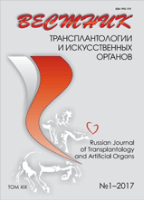
Vestnik Transplantologii i Iskusstvennyh Organov
Scope & Guideline
Unveiling critical insights in immunology and organ science.
Introduction
Aims and Scopes
- Transplantation Techniques and Outcomes:
The journal emphasizes the latest surgical techniques, outcomes, and innovations in organ transplantation, including heart, kidney, liver, and lung transplants. - Artificial Organ Development:
There is a significant focus on the creation and optimization of artificial organs and tissue engineering, highlighting advancements in biocompatibility and functional integration. - Regenerative Medicine:
Research in regenerative medicine is a core area, with studies on stem cells, tissue engineering, and cellular therapies aimed at improving transplant outcomes. - Immunology and Rejection Mechanisms:
The journal discusses immunological factors influencing transplant success, including rejection mechanisms and the use of immunosuppressive therapies. - Ethics and Policy in Organ Donation:
The journal also addresses ethical considerations and policy developments surrounding organ donation and transplantation practices, particularly within the Russian Federation.
Trending and Emerging
- Machine Perfusion Techniques:
There is an increasing emphasis on machine perfusion techniques, particularly for organ preservation and transplantation, which is seen as a critical area for improving graft outcomes. - 3D Bioprinting and Tissue Engineering:
The journal is seeing a rise in research focusing on 3D bioprinting technologies for creating complex tissue structures, which could revolutionize organ transplantation. - Long-Term Outcomes and Quality of Life Studies:
Emerging research is focusing more on long-term patient outcomes and quality of life post-transplant, reflecting a holistic approach to transplant medicine. - Nanotechnology in Transplantation:
The application of nanotechnology in improving biocompatibility and reducing rejection rates in transplant procedures is gaining traction among recent publications. - Personalized Medicine in Transplant Protocols:
There is a trend towards personalized medicine, with studies exploring tailored immunosuppressive regimens based on genetic and phenotypic patient factors.
Declining or Waning
- Traditional Organ Preservation Techniques:
There is a noticeable decrease in papers discussing conventional organ preservation methods, as the field shifts towards more innovative techniques like hypothermic machine perfusion. - Clinical Case Reports:
The number of clinical case reports has declined, indicating a potential shift towards more systematic reviews and experimental studies rather than individual case analyses. - Basic Science Studies Without Clinical Relevance:
Research that does not directly translate into clinical applications or innovations in transplantation is less frequently featured, as the journal prioritizes studies with clear clinical implications.
Similar Journals

ARTIFICIAL ORGANS
Transforming Healthcare Through Artificial Organ Research.ARTIFICIAL ORGANS is a leading academic journal published by Wiley, focusing on the interdisciplinary fields of bioengineering, biomaterials, and biomedical engineering. Established in 1977 and continuing through 2024, this journal plays a pivotal role in advancing research related to artificial organs and their impact on healthcare innovations. With an impressive impact factor and notable Q2 rankings across multiple categories, including Medicine and Biomedical Engineering, ARTIFICIAL ORGANS caters to a global audience of researchers, professionals, and students devoted to the latest developments in organ replacement and regenerative medicine. Although not an open-access journal, it maintains a rich repository of essential research articles, reviews, and case studies that collectively enhance the scientific community's understanding of artificial organ technologies. By publishing high-quality, peer-reviewed content, ARTIFICIAL ORGANS remains a vital source for emerging knowledge and collaborations in the exciting field of artificial organ research.
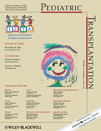
PEDIATRIC TRANSPLANTATION
Connecting research and practice to improve pediatric transplant outcomes.Pediatric Transplantation is a prestigious academic journal published by Wiley, focusing on the critical field of pediatric organ transplantation. Since its inception in 1997, the journal has played a pivotal role in disseminating groundbreaking research and clinical insights relevant to pediatric health, including both pediatrics and transplantation disciplines. With an impact factor that reflects its significance—ranking in the second quartile (Q2) within both Pediatrics, Perinatology and Child Health and Transplantation categories—it provides a vital platform for researchers and clinicians dedicated to improving outcomes for pediatric transplant patients. Pediatric Transplantation embraces a wide scope of studies, from basic science to clinical trials, promoting collaborations that enhance the well-being of young organ recipients. Published in the United Kingdom, this journal does not operate under an open access model, ensuring that the content is peer-reviewed and of the highest academic rigor. For professionals and scholars seeking to stay at the forefront of pediatric transplantation advancements, Pediatric Transplantation serves as an invaluable resource.
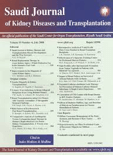
Saudi Journal of Kidney Diseases and Transplantation
Connecting scholars to revolutionize kidney care.Saudi Journal of Kidney Diseases and Transplantation, published by Wolters Kluwer Medknow Publications, serves as a vital resource in the fields of nephrology and transplantation, dedicated to advancing the understanding and treatment of kidney diseases. With an ISSN of 1319-2442 and E-ISSN 2320-3838, this esteemed peer-reviewed journal aims to facilitate scholarly exchange and promote innovative research since its inception in 2006. Recognized for its Open Access model since 2007, it enables widespread dissemination of critical findings, thereby enhancing the global impact of kidney-related research. With a solid reputation reflected in its current Q3 categorization in both Nephrology and Transplantation for 2023, the journal continues to contribute meaningfully to these essential medical fields. Researchers, clinical professionals, and students can access its wealth of information to further their knowledge and practice in kidney health and organ transplantation, vital components in the landscape of modern medicine.
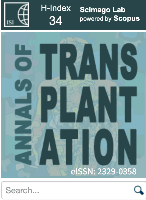
Annals of Transplantation
Elevating Standards in Transplantation PracticesAnnals of Transplantation is a renowned academic journal published by INT SCIENTIFIC INFORMATION, INC, dedicated to the field of transplantation medicine. With a strong historical presence since its inception in 1996, this journal continues to provide a vital platform for disseminating innovative research, clinical studies, and review articles that contribute significantly to the ever-evolving landscape of organ transplantation. Holding a respectable Q2 ranking in the field of transplantation and a Q3 ranking in broader medicine categories as of 2023, the journal stands out with an impactful repository of knowledge that caters to a diverse audience, including researchers, healthcare professionals, and students. While it currently does not operate under an open access model, the scholarly contributions within are crucial for advancing practices, policies, and outcomes in transplantation. Whether you are seeking to keep abreast of recent advances or looking to publish your own findings, Annals of Transplantation serves as an essential resource for fostering collaboration and innovation in medical science.
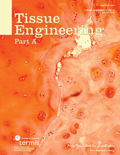
Tissue Engineering Part A
Advancing Tissue Engineering for Tomorrow's HealthcareTissue Engineering Part A is a prestigious peer-reviewed journal published by MARY ANN LIEBERT, INC that focuses on innovative research and advancements within the field of tissue engineering and regenerative medicine. Since its inception in 2008, this journal has played a critical role in disseminating cutting-edge findings that bridge the gap between laboratory research and clinical application, underscoring its significance in the scientific community. With a diverse scope encompassing biochemistry, bioengineering, biomaterials, and biomedical engineering, the journal ranks notably in the Scopus database, holding a Q2 quartile status across multiple categories, thus reflecting its high impact on ongoing research and professional practice. For researchers, professionals, and students, Tissue Engineering Part A serves as an invaluable resource, offering insights into the latest methodologies and breakthroughs that drive the future of healthcare and therapeutic strategies. While primarily a subscription-based journal, it ensures that vital research is accessible to a broad audience of scientists and engineers committed to advancing the life sciences.
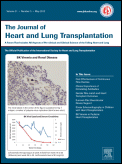
JOURNAL OF HEART AND LUNG TRANSPLANTATION
Unveiling New Horizons in Cardiovascular and Pulmonary MedicineJOURNAL OF HEART AND LUNG TRANSPLANTATION, published by Elsevier Science Inc., serves as a premier platform for researchers and clinicians in the fields of Cardiology, Cardiovascular Medicine, Pulmonary and Respiratory Medicine, Surgery, and Transplantation. Since its inception in 1991, this esteemed journal has maintained a robust impact within the scientific community, currently holding a remarkable Q1 ranking in multiple categories as of 2023, indicative of its influential contributions to the field. With Scopus rankings placing it among the top ten in Surgery and fourth in Transplantation, it is essential reading for those looking to stay at the forefront of innovative transplantation techniques and cardiovascular research. Although not an open access journal, its rich content is crucial for advancing knowledge and promoting best practices, making it indispensable for professionals, students, and researchers dedicated to the life-saving field of heart and lung transplantation. The journal continues to foster academic excellence and facilitate impactful research, addressing contemporary challenges and innovations within these critical areas.

CELL AND TISSUE BANKING
Fostering knowledge transfer in cutting-edge biomedical fields.CELL AND TISSUE BANKING, published by Springer, is a prominent journal dedicated to advancing the fields of biomaterials, biomedical engineering, cell biology, and transplantation. With its ISSN 1389-9333 and E-ISSN 1573-6814, the journal plays a crucial role in disseminating high-quality research from its inception in 2000 to its ongoing contributions through 2024. Situated in the Netherlands, it boasts a respectable 2023 impact factor with notable quartile rankings, positioning it within the Q3 category for biomaterials, biomedical engineering, and transplantation, and Q4 for cell biology. Furthermore, its Scopus rankings underscore its relevance and influence, particularly in the fields of medicine and engineering. Although it does not currently offer open access options, the journal remains a vital resource for researchers, professionals, and students alike, fostering innovation and knowledge transfer in the critical areas of cell and tissue sustainability.
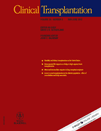
CLINICAL TRANSPLANTATION
Empowering the Global Transplantation CommunityClinical Transplantation is a leading journal in the field of transplantation medicine, published by Wiley. With an ISSN of 0902-0063 and an E-ISSN of 1399-0012, this prestigious journal has been pivotal in advancing the understanding of clinical practices and innovative research in transplantation since its inception in 1989. Based in the United Kingdom, it is recognized within the Category Quartiles as Q2 in Transplantation and boasts a respectable Scopus rank, placing it #20 out of 54 in its field, highlighting its significance. The journal serves as a platform for disseminating peer-reviewed articles that encompass a wide range of topics, from organ transplantation techniques to post-operative care and immunology, catering to researchers, healthcare professionals, and students alike. As the field progresses towards more personalized and effective treatment approaches, Clinical Transplantation remains committed to providing insight and fostering excellence in research for the global transplantation community.

Transplantation Direct
Connecting Researchers to Transform Transplantation OutcomesTransplantation Direct is a leading open access journal in the field of transplantation, published by the prestigious Lippincott Williams & Wilkins. Since its inception in 2015, the journal has provided a vital platform for the dissemination of high-quality research and advancements related to organ transplantation. With an impact factor that places it in the Q2 category among transplantation journals, it ranks #22 out of 54 in the Medicine - Transplantation Scopus classification, reflecting its significance and authority within the discipline. The journal not only covers a broad scope of topics related to transplantation but also encourages global collaboration and knowledge exchange amongst researchers, clinicians, and students. With its open access model, Transplantation Direct ensures that groundbreaking findings are accessible to a wider audience, fostering innovation and enhancing patient care worldwide. For more information, visit their address at TWO COMMERCE SQ, 2001 MARKET ST, PHILADELPHIA, PA 19103.
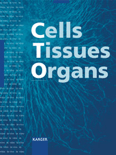
CELLS TISSUES ORGANS
Illuminating the Path to Understanding Biological Complexity.CELLS TISSUES ORGANS is a renowned academic journal published by KARGER, focusing on pivotal research within the fields of Anatomy and Histology. Based in Switzerland, this journal has been disseminating influential scientific findings since 1889, contributing to our understanding of cellular structures and tissue functionality. With a current impact factor that places it in the Q2 quartile for both disciplines, it serves as a vital resource for researchers, professionals, and students seeking to stay abreast of significant advancements and discussions in these areas. The journal embraces an Open Access model, ensuring that high-quality, peer-reviewed articles are freely available, thus enhancing visibility and accessibility of critical research. As it continues to foster scholarly communication and innovation up to 2024, CELLS TISSUES ORGANS plays a crucial role in shaping the future of biological sciences and medical research.